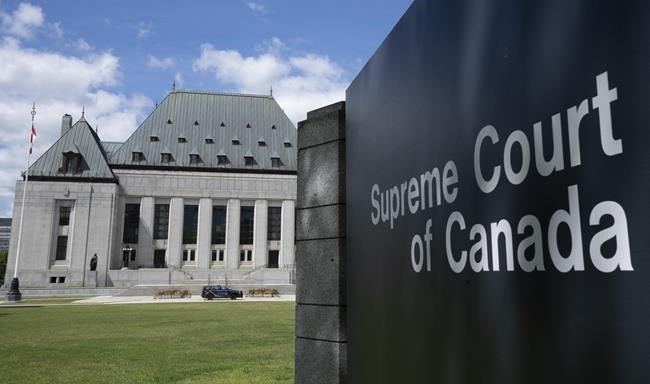OTTAWA — Refugee and human-rights advocates are telling the Supreme Court of Canada that a binational pact "contracts out" Canada's international obligations to refugee claimants to the United States, without proper followup to ensure Washington is doing the job.
In a written submission, opponents of the 18-year-old Safe Third Country Agreement ask the top court to declare the legislation underpinning the pact in violation of the Section 7 Charter of Rights and Freedoms guarantees of life, liberty and security of the person.
The Supreme Court is slated to hear oral arguments on Thursday about the constitutionality of the agreement, under which Canada and the United States recognize each other as havens to seek protection.
The pact allows Canada to turn back prospective refugees who show up at land ports of entry along the Canada-U.S. border on the basis they must pursue their claims in the U.S., the country where they first arrived.
The Canadian government argues in its own brief to the court that returnees have access to fair asylum and detention processes south of the border. "It is not unreasonable to remove claimants to the United States so that they can claim protection in that country."
Canadian refugee advocates have long battled the asylum agreement, contending the U.S. is not always a safe country for people fleeing persecution.Â
Several refugee claimants took the case to Federal Court along with the Canadian Council for Refugees, the Canadian Council of Churches and Amnesty International, who participated in the proceedings as public interest parties.Â
In each case, the applicants, who are citizens of El Salvador, Ethiopia and Syria, arrived at an official Canadian entry point from the U.S. and sought refugee protection.Â
They argued in court that by returning ineligible refugee claimants to the U.S., Canada exposes them to risks in the form of detention and other rights violations.Â
In her 2020 decision, Federal Court Justice Ann Marie McDonald concluded the Safe Third Country Agreement results in ineligible claimants being imprisoned by U.S. authorities.Â
Detention and the consequences flowing from it are "inconsistent with the spirit and objective" of the refugee agreement and amount to a violation of the rights guaranteed by Section 7 of the Charter, she wrote.Â
"The evidence clearly demonstrates that those returned to the U.S. by Canadian officials are detained as a penalty."Â
However, the Federal Court of Appeal overturned the decision last year.Â
"The alleged constitutional defect in this case stems from how administrators and officials are operating the legislative scheme, not the legislative scheme itself," the Appeal Court said.Â
"But because the claimants chose not to attack any administrative conduct, we have neither the ability nor the evidence before us to assess it."Â
The Court of Appeal also found the legislative regime consistent with the Charter unless the treatment experienced by those sent back to the U.S. could be shown to "shock the conscience."Â
In their submission to the Supreme Court, the claimants and advocates say the Appeal Court "declined to engage with the substantive merits of the case" and adopted a "highly restrictive approach to Charter review."
They argue the U.S. immigration detention system has been "widely condemned for its serious violations of international minimum standards" for holding asylum seekers.Â
"This legislative scheme effectively contracts out Canada's international obligations to refugee claimants based on the premise that the U.S. will fulfil those obligations for us," the submission says.
While Canada is required by law to ensure this premise remains valid through ongoing monitoring of U.S. asylum policies and practices, "it has failed to do so," they argue.
On the contrary, the government says, at the time of the Federal Court hearing, Canadian review of the binational agreement was "efficient, effective, and thorough," and the information gathered did not reveal significant problems.Â
This report by The Canadian Press was first published Oct. 5, 2022.
Jim Bronskill, The Canadian Press




